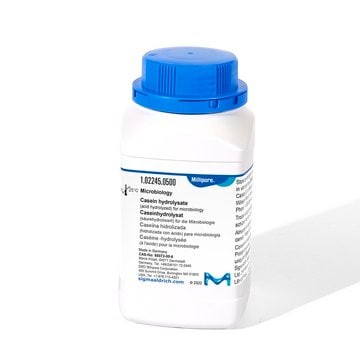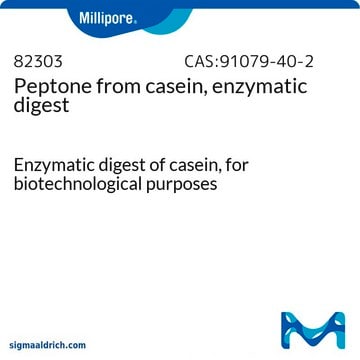22090
Casein Peptone
Enzymatic digest of casein from bovine milk, suitable for biotechnology and microbiology
Synonym(s):
Peptone from casein, Casein Hydrolysate, Pancreatic hydrolysate of casein, peptone from casein
About This Item
Recommended Products
product name
Casein Hydrolysate, suitable for microbiology, Nitrogen source in culture media
biological source
bovine milk
Quality Level
form
powder
composition
total nitrogen (N), ≥11%
storage condition
(sealed container)
impurities
≤3.5% chloride (expressed as NaCl)
ign. residue
≤8%
loss
≤6.0% loss on drying
pH
6.0-7.0 (25 °C)
solubility
H2O: 2%, clear, faintly yellow to brown
application(s)
food and beverages
microbiology
storage temp.
10-30°C
Looking for similar products? Visit Product Comparison Guide
Related Categories
General description
Application
Other Notes
Storage Class Code
11 - Combustible Solids
WGK
WGK 3
Flash Point(F)
Not applicable
Flash Point(C)
Not applicable
Personal Protective Equipment
Choose from one of the most recent versions:
Already Own This Product?
Find documentation for the products that you have recently purchased in the Document Library.
Customers Also Viewed
Articles
Culture media provides a habitat with suitable nutrients, energy sources, and certain environmental conditions for the growth of microorganisms. The components of the culture media range from simple sugars to peptones, salts, antibiotics, and complex indicators.
Our team of scientists has experience in all areas of research including Life Science, Material Science, Chemical Synthesis, Chromatography, Analytical and many others.
Contact Technical Service













